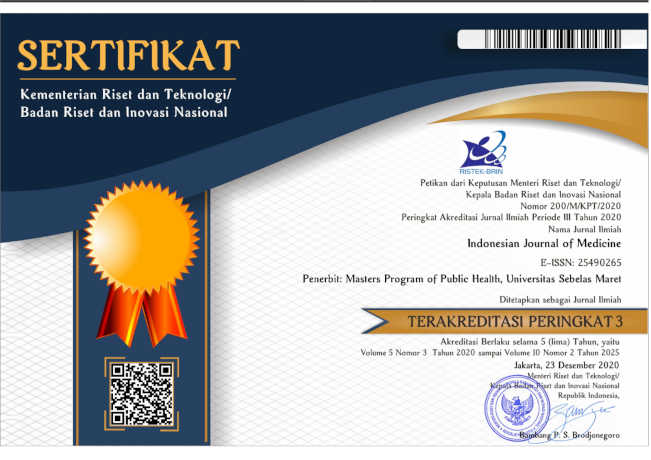Relationship between Knowledge and Family Support regarding Hypertension with Blood Pressure Control in Elderly
DOI:
https://doi.org/10.26911/theijmed.2017.2.1.36Abstract
Background: Hypertension is one of the degenerative diseases that have frequently been found among the group of elderly. If hypertension goes uncontrolled, then it might escalate and cause complication. The level of knowledge for both of patients and their families in terms of preventive actions toward hypertension complication is expected to be able to control blood pressure. Among the hypertension patients, the role of family support is very important in order to maintain and to control that the blood pressure will not increase and to return it to the normal state. In relation to this background, the objective in conducting this study was to analyze the relationship between knowledge and family support regarding hypertension with blood pressure control among the elderly with hypertension in the Sangkrah Center of Public Health, City of Surakarta.
Subjects and Method: This was an analytic observational study with cross sectional design. This study was conducted in Sangkrah Community Health Center in the City of Surakarta on November 2016. A total sample of 147 elderly were selected for this study by purposive sampling. The dependent variables in this study was blood pressure and was measured by sphygnomanometer. The independent variables were knowledge and family support and were collected by a set of questionnaire. The data analyzed by logistic regression.
Results: Family knowledge (OR= 0.38; 95% CI= 0.13 to 1.08; p= 0.070) increased the likelihood of blood pressure control. Elderly who came from family with good knowledge regarding hypertension had 0.4 times better blood pressure control in comparison to those who came from family with poor knowledge regarding hypertension. Family support (OR= 0.43; 95% CI= 0.18 to 1.02; p= 0.046) increased the likelihood of blood pressure control. Elderly with good family support had 0.4 times better blood pressure than those who had poor family support.
Conclusion: Family knowledge and family support increase the probability of blood pressure control among elderly with hypertension.
Keywords: knowledge, family support, blood pressure control, elderly
Correspondence: Iin Kusumawardana. Masters Program in Family Medicine, Sebelas Maret University, Jl. Ir. Sutami 36 A, Surakarta 57126, Central Java. Email: iinkusuma90@gmail.com
Indonesian Journal of Medicine (2017), 2(1): 1-9
https://doi.org/10.26911/theijmed.2017.02.01.01
References
Abdullah, Masqon (2005). Kejadian Penyakit Jantung di Indonesia, http://www. fkm.undip.ac.id/data/index.php?action=&idx=2701, diakses 20 Juli 2016
Awotidebel TO, Adedoyini RA (2014). Knowledge, attitude and Practice of Exercise for blood pressure control: A cross-sectional survey. Department of Medical Rehabilitation, College of Health Sciences, Obafemi Awolowo University, Journal of Exercise Science andPhysiotherapy 10(1): 1-10.
Badan Penelitian dan Pengembangan Kesehatan Kementrian Kesehatan RI. (2013). Riset Kesehatan Dasar (Riskesdas) 2013. Jakarta.
Dahlan M (2009). Besar Sampel dan Cara Pengambilan Sampel dalam Penelitian Kedokteran dan Kesehatan. Jakarta: Salemba Medika.
Dinkes Kota Surakarta (2014). Profil Kesehatan Kota Surakarta tahun 2014. Dinas kesehatan Kota Surakarta.
Friedman MM, Bowden JEG (2003). Family Nursing: Research, theory and Practise Fifth edition. New Jersey: Prentice Hall.
Godfrey BS, Iyalomhei, Sarah I (2010). Hypertension related Knowledge, Attitudes and Life Style Practices among hypertensive patients in a Sub-Urban Nigerian Community. Journal of Public Health and Epidemiology 2(4): 71-77.
Gottlieb BH (2003). Social Support Strategies (Guidelines for Mental Health Practise). California: Sage Publication.
Gunawan L (2001). Hipertensi Tekanan Darah Tinggi. Yogyakarta: Kanisius
Kuntjoro (2002). Dukungan Sosial pada Lansia.http://www.epsikologi.com/usia/Jakarta. Diakses 7 Mei 2016
Margatan A (2005). Kiat Hidup Sehat Bagi Lanjut Usia. Rineka Cipta: Solo.
McMurray A (2003). Community health and wellness: A sociological Approach. Philadelpia: Mosby
Murti B (2013). Desain dan Ukuran Sampel Untuk Penelitian Kuantitatif dan Kualitatif di Bidang Kesehatan. Yogyakarta: Gajah Mada University Press
Notoatmodjo S (2007). Promosi Kesehatan dan Ilmu Perilaku. Jakarta: Rineka Cipta
Nugraha BK (2014). Hubungan Tingkat Pengetahuan Keluarga dengan Sikap Pencegahan Komplikasi pada Pasien Hipertensi di Wilayah Kerja Puskesmas Sangkrah Surakarta. Skripsi. Universitas Muhammadiyah Surakarta.
Sheps, Sheldon G (2005). Mayo Clinic Hipertensi, Mengatasi Tekanan Darah Tinggi. Jakarta: PT Intisari Mediatama.
Setiadi (2008). Konsep dan Keperawatan Keluarga. Yogyakarta: Graha Ilmu.
Setyaningrum D (2009). Hubungan Dukungan Sosial Keluarga Dengan Kepatuhan Menjalani Terapi Hemodialisa Pada Pasien Gagal Ginjal Kronik di Unit Hemodialisa RS PKU Muhammadiyah. Program studi ilmu keperawatan. STIKES Aisyah Yogyakarta
Wijaya R (2010). Pada Usia Lanjut Tekanan Darah Harus Terkontrol://http.www. dradio1034fm.or.id. diakses 20 April 2016
Yenni (2011). Tesis Hubungan Dukungan Keluarga dan Karakteristik Lansia dengan Kejadian Stroke pada Lansia Hipertensi di Wilayah Kerja Puskesmas Perkotaan Bukittinggi. UI.
Zulfitri R (2006). Hubungan Dukungan Keluarga dengan Perilaku Lanjut Usia Hipertensi dalam mengontrol Kesehatannya di Wilayah kerja Puskesmas Melur Pekanbaru. Tesis FIK UI Jakarta.











